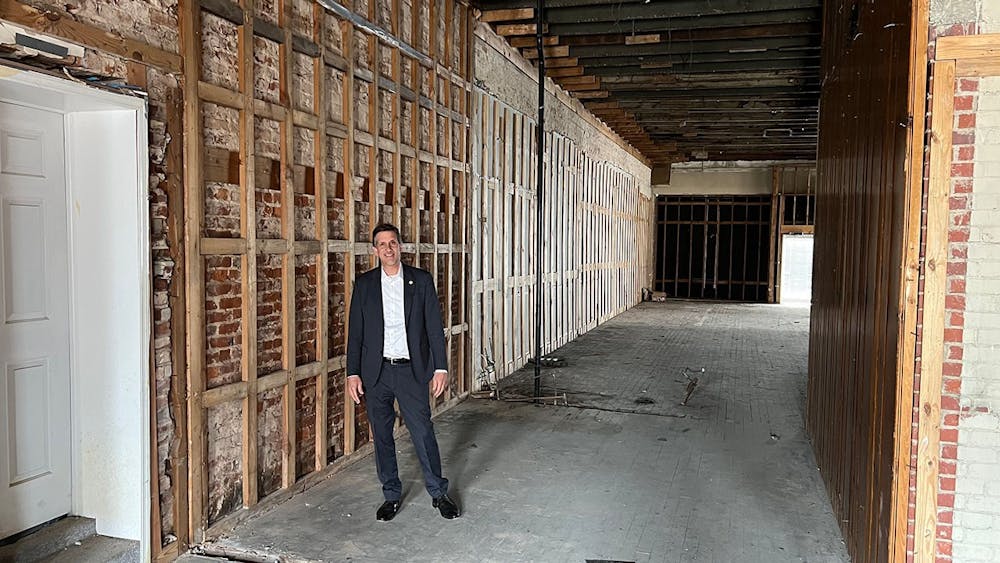There is a back room in Columbia where two previous state senators drink bourbon and talk politics. Vincent Sheheen and Joel Lourie, however, do it to educate South Carolina through their podcast, Bourbon in the Backroom.
It’s a time when former legislator Sheheen sips bourbon and talks local government, but it’s also an example of how since losing re-election in 2020, Sheheen, 50, has continued what many call a generational and lifelong commitment to public service.
Sheheen’s life certainly changed in 2020. It marked the end of a 20-year career in SC politics — a career that included serving as a state representative and senator, working on notable bills, like removing the Confederate flag from the Statehouse grounds and running a record-setting gubernatorial campaign.
“I enjoyed it. I don't regret any of it. It was time to come to a close, honestly,” Sheheen acknowledged.

His days today are consumed with exploring several passion projects, like starting his podcast, restoring historic Camden buildings and continuing to teach USC students.
All of these new projects are possible because of a developed skillset from his political experience, Sheheen said. He likens his work to a puzzle.
“There’s this picture at the end, and you just have to put the pieces together to get there. And the pieces normally are different people, different governmental entities, different nonprofit entities, businesses — that's kind of like the pieces and making things happen,” Sheheen said.
He said he likes people, puzzles and making the pieces fit. And after so long in politics, he knows this process well. He added he appreciates the fact it helps that he knows so many people.
“I know people around the state, I can go anywhere in the state and have lunch with somebody because I know somebody in every town,” Sheheen said.
Those close to Sheheen continuously describe him as deliberative, collaborative, capable, a good negotiator and genuinely helpful. Sheheen said this all comes from his family.
His family has been heavily involved in the state for generations. His father was SC commissioner of higher education, and his uncle was Speaker of the House in SC for many years.
His frequent family gatherings are Lebanese Southern — kibbeh and tabbouleh with fried chicken and biscuits. His childhood was the old aristocratic South mixed with the entrepreneurial spirit of his immigrant family, he said.
Dr. Robert Oldendick, recently retired from the USC political science department as director of graduate studies, has studied political science for more than 30 years and has worked with both Sheheen and his father through USC.
“I've described it as just a lifetime of public service,” said Oldendick. “There's always been this orientation to try to make South Carolina a better place.”
This community and family raised him, but their priorities are the inspiration for his commitment to public service, Sheheen said.
A central idea behind the podcast — and the reason he picked up the phone one day to pitch the idea of co-hosting to Joel Lourie — was helping the people of South Carolina be more informed about state government and politics.
Sheheen said he noticed a change over the years in how people valued and consumed reporting about Statehouse goings-on.
“People don't know what's going on at the Statehouse,” Sheheen said. “When my uncle was there, he told me they were about 45 press people assigned to the Statehouse. And now there's like five.”
Although the two hosts are liberal, Sheheen said they work hard to remain neutral in their podcast while also trying to entertain and provide critical information. The podcast works to explain what goes on behind the scenes of the Statehouse by introducing a variety of guests who talk about their work.
“It gives us a chance to stay engaged. And, once you get the political bug, it’s very hard to get that out of your system,” Lourie said.
Education is another longtime interest for Sheheen. A graduate of Clemson and USC School of Law, he has been teaching students in various ways before his time at the Statehouse.
Today, he has combined the two by bringing the podcast into the classroom, such as recording a live episode in class with Tameika Issac Devine and now-Mayor Daniel Rickenmann during the 2021 Columbia mayoral elections. For another episode, he brought a podcasting class from Allen University to observe their recording session.
His main teaching focus is a program run through USC’s Honors College called the State Government Program, previously the South Carolina Semester Program, where he teaches a discussion-based class by similarly bringing in guests that elucidate Carolina politics. The program then leads to an internship at the SC Statehouse.
Sheheen’s class helped erase some of Morgiana McDevitt’s preconceived notions about partisanship and people in South Carolina politics. The fourth-year environmental studies student and Long Island, New York native has served as Speaker of the Student Senate at USC.
“The class just showed me a different perspective of something I wouldn't have realized about South Carolina being an out-of-state student, hearing from people who are political, who aren’t, who are lobbyists, who are senators,” McDevitt said.
Today, Sheheen still thinks of himself as a public servant with a priority for family. It will always be part of who he is, he said.
However, today he defines himself through the many things he has picked up since 2020 — his passion for restoring buildings, growing his law firm, the podcast, teaching and bringing government education to South Carolina.
“I used to always feel like I was in a rush,” Sheheen joked. “Even when I was going home, I felt like I had to get home really quick, and now it's like I drive the speed limit and it's all good.”

